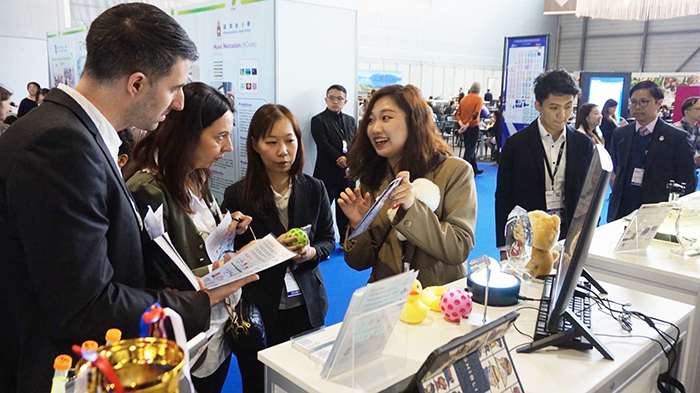November 2024 | Volume 26 No. 1
Pepping up the Pooch
Listen to this article:
Dogs play a central role in many people’s lives – not only as family pet, companion or exercise facilitator, but often as child substitute. Others have professional roles – be they sniffing out drugs or explosives, police dog or emotional support animal.
As part of the 2024 Pitching Corner hosted by the Advanced Biomedical Instrumentation Centre (ABIC), one of HKU’s nine research laboratories established under the HKSAR Government’s InnoHK initiative, research team members Dr Joy Wang Qiaoyi, Mr Chi Song and Dr Eric Han Ziyu came up with the wellness ball idea. They wanted to develop practical biomedical devices that could have a positive impact on people’s lives. In view of a fast-ageing society with a decreasing birth rate, leading many individuals to opt for companions like cats and dogs instead of having children, they began to question whether we were providing enough care for the health of pets who, just like humans, can experience emotional issues and stress.
“This thought marked the exciting inception of our project – ‘Saliva Mental: Dog Wellness Assessment Ball’ – which has been under development for the past seven months,” said Dr Wang. “The goal was to provide owners with a simple method for assessing the mental state of their pets in the hope of contributing to their overall wellness and enhancing the bond between pet and owner.”
The concept explores a mental wellness solution featuring a play ball with saliva collection functionality. This design encourages natural interaction and potential stress hormone detection through the accompanying test strips. It is user-friendly and can be seamlessly integrated into the daily routine, enabling dog owners to easily assess and understand their pets’ mental wellness.
“The technology employed for the saliva strips is a classic gold-colloidal method for detection,” said Dr Wang. “This method allows us to measure cortisol levels, which are a stress biomarker. Since dogs naturally produce a significant amount of saliva, it provides an excellent medium for testing various biomarkers. The product is still in development and not yet a finalised solution.
“Apart from cortisol, the strips could further be adapted to test for the presence of viruses in dogs, assess their oral health, detect signs of inflammation, etc.”
The saliva collection process is integrated into a toy-like ball design, an innovative approach designed to encourage dogs to engage with the ball and naturally deposit saliva while playing.
“In today’s society, where many individuals live alone and worry about their pets’ well-being while they are away at work, this ball serves as more than just a wellness assessment tool,” said Dr Wang. “It will allow pet owners to gauge their dogs’ stress levels and determine if they had a relaxing day. This fun aspect of the product also promotes interaction and bonding between pet owners and their dogs.”
The project has been successfully accepted into the ideation programme of the Hong Kong Science and Technology Parks Corporation in 2024. Riding on existing manufacturing techniques, the project has the potential to be commercially viable in the near future with further technical refinement and business model development.
Breaking the mould
The team also feel there needs to be more awareness of the efficacy of saliva as a viable medium for assessing biomarkers. “Pet clinics predominantly rely on invasive and stressful blood draws, as they consider blood-based results as the gold standard,” said Dr Wang. “To establish the credibility and effectiveness of saliva testing, further research is needed to establish correlations between biomarker levels in saliva and blood.”
Additionally, the team recognise the importance of shaping public opinion. “Informing pet owners about the importance of early prevention and regular check-ups is crucial to avoid major health issues,” said Dr Wang. “Our product may be viewed as ‘avant-garde’ in this context, as it emphasises proactive and preventive care to prolong the lifespan of pets. Changing the mindset of pet owners and highlighting the benefits of our solution will be instrumental in driving its commercial viability.”
The project has attracted interest from other scientists and animal experts, one of whom suggested some rather more ambitious applications. “During a conversation with a zookeeper in Geneva, she inquired about the applicability of our ball to larger animals like lions, as collecting samples from them can be dangerous,” said Dr Wang. “While our current focus is on dogs, the concept of utilising the ball for larger animals is an intriguing possibility for future exploration.”
The ‘Saliva Mental: Dog Wellness Assessment Ball’ received the Most Favorite Pitching Award at ABIC’s Pitching Corner event, for which eight projects from a multidisciplinary biomedical field were shortlisted and presented, highlighting scientific and technological breakthroughs and the potential for commercialisation and translatability.

Dr Wang (centre) presenting the Dog Wellness Assessment Ball at the International Exhibition of Inventions of Geneva 2024, where it won a Silver Medal.
The goal was to provide owners with a simple method for assessing the mental state of their pets in the hope of contributing to their overall wellness and enhancing the bond between pet and owner.

Dr Joy Wang Qiaoyi

